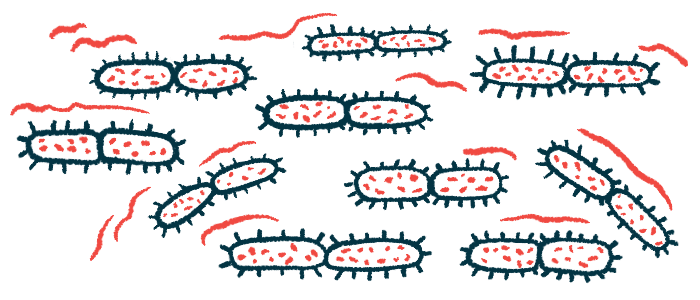Bacterial airway infection in CF tough to eradicate: 20-year study
Burkholderia cepacia complex can return year or two after it has cleared
Written by |

More than half of the infections caused by the Burkholderia cepacia complex (BCC), a bacteria known to cause serious complications in people with cystic fibrosis (CF), were successfully eradicated, a 20-year study reported.
Despite some CF patients testing negative following initial treatment for more than two years, however, subsequent sputum samples tested positive for BCC.
“These results confirm that microbiological surveillance with regular sputum samples remains key to accurately determining infection status after isolation of BCC,” the researchers wrote.
“A cautious approach to segregation should be maintained after new isolation of BCC in CF,” they noted in the study, “When is Burkholderia cepacia complex truly eradicated in adults with cystic fibrosis? A 20-year follow up study,” published in the Journal of Cystic Fibrosis.
Burkholderia cepacia complex known to cause serious airway infections
Burkholderia cepacia complex is a bacteria known to cause serious infections in the airways of people with CF, a genetic disorder marked by the buildup of thick mucus in various organs, including the lungs. Despite a recent drop in BBC prevalence due to strict segregation and infection control measures, new infections continue to occur.
Because BCC is associated with antibiotic resistance, eradicating it can be challenging. Moreover, treatment methods can vary between centers due to a lack of established protocols and supporting studies. Only the U.K. CF Trust has suggested that at least three sputum samples testing negative for BCC over one year is a potential criterion for eradication.
Scientists at the Manchester Adult Cystic Fibrosis Centre (MACFC), in the U.K., followed for 20 years all cases of CF patients with BCC who were once isolated and treated at the clinic. Burkholderia cepacia complex was considered eradicated using the U.K. CF Trust’s criteria.
“Our aims were to determine the duration after which it is likely that BCC has been eradicated or cleared, and where BCC was eradicated any significant differences in treatment duration or modality,” the researchers wrote.
Overall, there were 53 BCC isolations in 48 individuals, with five having new isolations of more than one BCC strain. Two people died within one year of initial tests.
Eradication treatment with antibiotics was given to 46 patients. Among four patients who declined such treatment, one had chronic infection with multiple isolations of BCC, and three (10.7%) saw their BCC infection spontaneously clear.
BCC was eradicated in 25 of the 46 cases (54%), while the remaining 21 (46%) resulted in chronic infection, defined as ongoing positive tests for the same BCC strain. Of the seven patients who died before the end of follow-up, five had chronic BCC infections, and two had their infection successfully eradicated.
Among successfully eradicated infections, 13 (52%) of the 25 cases had BCC isolated only once. BCC was eradicated twice in four patients (16%), three times in five patients (20%), and four times in two cases (8%).
In one patient, BCC was isolated four times within the first six months before and during eradication treatment, with negative test results over the next six months. After twice testing positive one year later, this person underwent successful eradication treatment.
Researchers noted a significantly higher proportion of positive sputum samples in the first six months among patients with chronic BBC infection relative to those who saw their infections eradicated (60% vs. 18%).
Among patients with no positive samples six to 12 months after initial testing, five (16.7%) eventually developed chronic infection. For three of them (10.7%), tests were negative from 12 to 24 months after the initial isolation, but all of the same strains were subsequently isolated after 24 months.
Without an established BCC treatment regimen, eradication therapy using antibiotics, administered either orally, nebulized, or directly into the bloodstream, varied among patients.
The administration route or the maximum number of antibiotics did not differ between successful BCC eradications and chronic infections, the researchers reported. Still, the median number of treatment days was significantly longer among BBC-eradicated patients than those with chronic infections (42 vs. 28 days).
“Over half the patients from whom BCC was isolated did not progress to chronic infection,” the researchers wrote. “However some individuals did exhibit an interim period of negative sputum samples after initial isolation before re-emergence of BCC, both at 6–12 months and for a smaller [group at] 12–24 months.
“Although many centres attempt eradication of BCC, the value of BCC eradication therapy or optimum treatment regimens remains unclear,” the researchers added.







